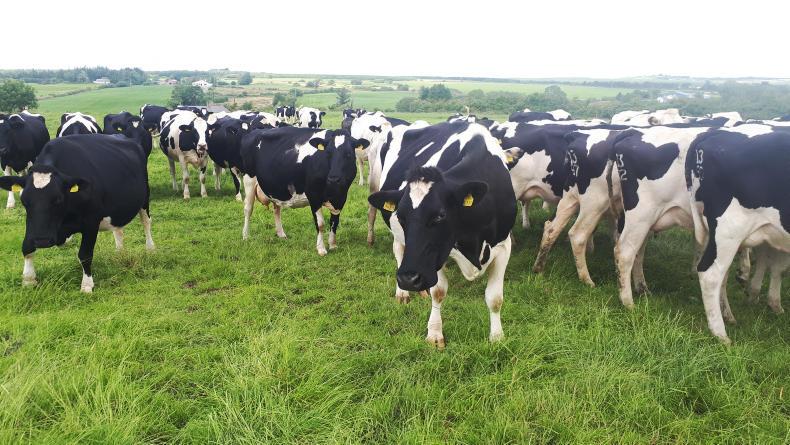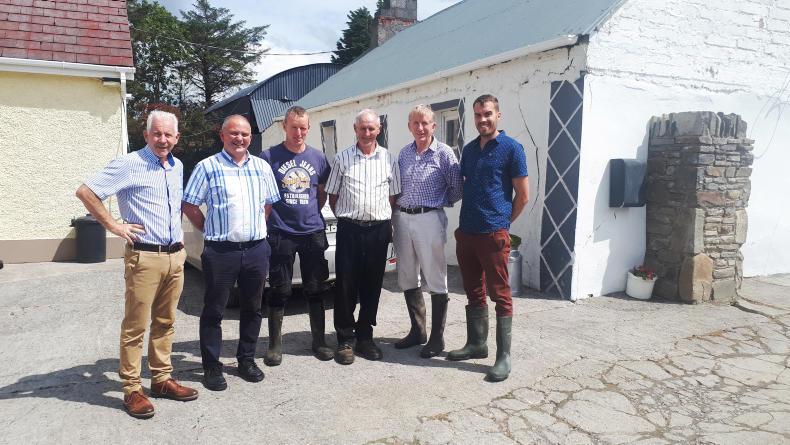The Hanrahan land base is fairly typical of land in the region. Some very good land mixed in with some land that has been deep-drained but ultimately can grow good grass in the summer.
The farm supplied Newtownsandes Co-op in the past but has supplied North Cork Co-op since the merger in late 2018.
Liam is very hands-on, having recently taken over the reins from his father, Tom. He is involved in most of the work around the yard in terms of milking, construction and machinery.
As well as being a qualified farmer, Liam is a welder by trade and when we called he was just after rolling a new bale trailer out of the shed and it was sitting sparking with new paint in the summer sunshine.
The rest of the trailers were laden with hay as a bounty of winter feed saved from land away from the farm was stacked to be used or moved on.

The Hanrahan herd are a nice type of Friesian with plenty of mature Friesian cows.
This is one of the challenges with this farm – there are 80 acres for grazing around the yard but, in total, over 215 acres are farmed.
The challenge for the dairy business is how to make this pay long term as land upkeep is expensive unless real returns are possible.
With that in mind, herd size is gradually increasing, but Liam is mindful that a lot depends on the weather and grazing conditions in this part of the country.

Darren Deasy, North Cork Co-op with Liam Hanrahan and the judges.
In 2018, 74 cows were milked, with that figure increasing to 81 for 2019. A total of 30,700kg of milk solids were delivered in 2018, with about 1,000kg of meal fed per cow. See key stats.
The drought would have affected 2018 grass growth rates, but not as badly as farms in the east of the country. Replacements are reared on the farm – 20 in-calf heifers and 20 heifer calves.
Liam was in Pallaskenry prior to farming at home and is a member of his local discussion group.
The parlour is a nine-unit herringbone, so it’s one person milking
His goal in the short term is to improve the quality of the cows by lifting the EBI and milk solids produced in the herd.
The parlour is a nine-unit herringbone, so it’s one person milking, and it’s hot-washed every morning to keep TBC levels less than 10 for most of the year.
Circodine P is the detergent used to wash the parlour, BFS for the bulk tank and Quatro is the product used for teat spraying.
The Hanrahan land base is fairly typical of land in the region. Some very good land mixed in with some land that has been deep-drained but ultimately can grow good grass in the summer.
The farm supplied Newtownsandes Co-op in the past but has supplied North Cork Co-op since the merger in late 2018.
Liam is very hands-on, having recently taken over the reins from his father, Tom. He is involved in most of the work around the yard in terms of milking, construction and machinery.
As well as being a qualified farmer, Liam is a welder by trade and when we called he was just after rolling a new bale trailer out of the shed and it was sitting sparking with new paint in the summer sunshine.
The rest of the trailers were laden with hay as a bounty of winter feed saved from land away from the farm was stacked to be used or moved on.

The Hanrahan herd are a nice type of Friesian with plenty of mature Friesian cows.
This is one of the challenges with this farm – there are 80 acres for grazing around the yard but, in total, over 215 acres are farmed.
The challenge for the dairy business is how to make this pay long term as land upkeep is expensive unless real returns are possible.
With that in mind, herd size is gradually increasing, but Liam is mindful that a lot depends on the weather and grazing conditions in this part of the country.

Darren Deasy, North Cork Co-op with Liam Hanrahan and the judges.
In 2018, 74 cows were milked, with that figure increasing to 81 for 2019. A total of 30,700kg of milk solids were delivered in 2018, with about 1,000kg of meal fed per cow. See key stats.
The drought would have affected 2018 grass growth rates, but not as badly as farms in the east of the country. Replacements are reared on the farm – 20 in-calf heifers and 20 heifer calves.
Liam was in Pallaskenry prior to farming at home and is a member of his local discussion group.
The parlour is a nine-unit herringbone, so it’s one person milking
His goal in the short term is to improve the quality of the cows by lifting the EBI and milk solids produced in the herd.
The parlour is a nine-unit herringbone, so it’s one person milking, and it’s hot-washed every morning to keep TBC levels less than 10 for most of the year.
Circodine P is the detergent used to wash the parlour, BFS for the bulk tank and Quatro is the product used for teat spraying.








 This is a subscriber-only article
This is a subscriber-only article









SHARING OPTIONS: